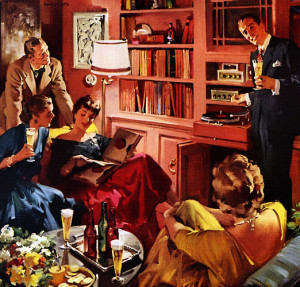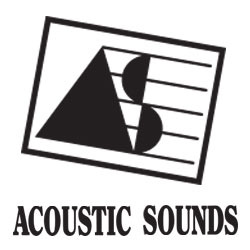WHY HI-FI?
All of those clichés about music being the food of love, soothing savage breasts, and the rest? They’re true, absolutely true, each and every one of them. And, despite evidence that popular music is flushing itself down the toilet, there are still a million reasons for wanting perfectly-reproduced music in the home.
Here are but five…
1) MUSIC DOESN’T SUCK, NO MATTER WHAT YOU THINK OF JEDWARD
Any of you who qualify as Baby Boomers grew up with the Beatles, Elvis, Dylan, the Stones, and more. Now in retirement? Then you just might remember the awesome sweep of big band music, the dawn of Sinatra, the golden age of Broadway musicals. Under 50? Then you’ve got the delights of Prince, grunge, R.E.M., rap, and a bunch of other genres and artists decipherable only to your generation. Younger still? Then you deserve to Fleet Foxes or Feeder in all their glory – beyond the tinny wheeze of your iPod headphones or – worse – the speakers in your laptop.
Naturally, there are those who will always spout self-serving nonsense of the they-don’t-make-’em-like-that-anymore variety, and more than one audiophile has been heard to say stuff like, ‘There hasn’t been any decent music since Frank left Capitol/Buddy died/Elvis went into uniform/John met Yoko/Kurt swallowed his rifle/delete as applicable.’ You’ll never get me to equate Coldplay with the Beatles, no matter how many albums they sell. Fact is, all music deserves to be heard at its best, just as every good meal deserves the finest china, every film the cleanest screen, every car the smoothest road.
Why? Because the better the sound system, the more you hear, the closer you get to the musicians themselves, and the more realistic the experience. Whatever anyone tells you, the original definition of high fidelity remains the best: being true to the original sound. And whatever reasons anyone gives you for acquiring a state-of-the-art system, the one which matters most is the act of recreating a musical event in one’s home. And you know you’ve achieved it when, if only for a fraction of a second, you do a magical double-take, caused by your brain being fooled into thinking that the performers were in your room.
No-one wants to sound like his father did when it comes to criticising music. My old man’s belief was that Glenn Miller is the greatest musician who ever lived and the Beatles sucked. The fact that half of musicians of his era – from Ella to Sarah, Al Martino to Perry Como, and, yes, even Frank – covered Beatles tunes offered no redemption. But, unlike Dad, I’ll listen to music from any era and nearly any genre. And I see no reason to play Dwight Yoakum on a lesser system than would be used for Pavarotti.
Bottom line? If you have more than a passing interest in music, if you use it as more than aural wallpaper, then you should experience it with the finest playback equipment money can buy. And the greatest buzz, after that system is installed, is rediscovering your favourites, as you’ve never heard them before.
2) YOUR EYES AND YOUR EARS ARE ONLY A COUPLE OF INCHES APART
Probably the biggest revolution in home entertainment of the last 20 years was the emergence of home theatre – not CD, not satellite broadcasting, not even downloads nor streaming, but the ability to play feature films at home without having to install a 70mm projector and rent movies on pancake spools. The pivotal moment was the arrival of ‘hi-fi sound’ from VCRs, followed by top-quality images from DVD, then – even better – Blu-ray, and more recently, the arrival of fabulous flat screen displays for sane prices.
When people realised that watching movies at home could be more than a 26in diagonal, mono experience, the way we enjoyed films also changed the way we socialized. It brought back the notion of a family room, inspired whole groups of friends to converge on homes to watch rented video tapes with a mini-community spirit, and – in some cases – allowed us to see and hear great movies to better effect than we could in most theatres. Yes, it is possible to create a better playback system in your home than you’d find in a typical multiplex.
So, if you’re film buff, or if you love having friends over to scoff up a few buckets of popcorn while watching a crystal-clear images of Jet Li or Matt Damon and while surrounded by sound as God and Ray Dolby intended you to hear it, well, you gotta have a killer system. As with that first burst of a state-of-the-art music system, so, too, are the revelatory effects of seeing AND hearing a favourite film in with surround to match your pure-music standards.
3) HI-FI IS ONE OF THE COOLEST YEAR-ROUND TOYS – AND IT AIN’T NECESSARILY SOLO
Whatever your passion – skiing, cars, boating, sky-diving – in many cases you have to leave the comforts of your home, pray that the weather is just so, or do it alone. Music? It’s a 365-days-a-year, in-your-home, at-your-leisure affair. Do it alone or with friends, morning or evening, clothed or in the buff, sober or sloshed (the latter not recommended if you still use LPs).
We tend to take music for granted because it seems that we can’t escape it. In elevators, restaurants, shops, car showrooms, at the hairdresser’s – it’s as if we can no longer bear silence. And this constant flow of mood music has cheapened the ‘real thing’. But it’s never what you want to hear at a precise, given moment, right? Conversely, the best way to hear music is live, but can you really skip your child’s graduation ceremony because a buddy got tickets for B.B. King? I don’t think so.
Now I’m not about to suggest for a moment that a recording of B.B. King is a substitute for the genuine article. But the best of the current crop of high-end components will deliver as close a facsimile as is possible given today’s technology. It all harks back to the original need for the development of recording: to provide more music for more people, for those who – whether it was because of location or limited income – couldn’t hear the live performances of the day. A hi-fi system, just like the very first wind-up gramophones, liberates us and allows us to savour our favourite music whenever we’re in the mood.
And the ‘toy’ value? Alongside building model kits, collecting watches and tinkering with cars, there are no limits to the hands-on involvement. OK, chronic audio tweaking is a disease best avoided if you don’t want to end up with a habit which could have the reverse effect – ruining your appreciation of music because you’ve become too much of a perfectionist – but the toys are cool. And you don’t have to license them or take them outside.
Admittedly, most of your friends or colleagues will fail to see the attraction, but maybe they will hear it. Who knows? Hearing your system might even rekindle their love for music.
4) MUSIC HAS BEEN DISSED FOR TOO LONG…
Although this might seem to contradict Reason 2, above, the music video, downloading, pirating and other ‘benefits’ of digital technology have done more to destroy the integrity of music than any other forces. Sure, some miserable, celibate musicologist who believes that music died with Mozart might point to jazz, rock’n’roll, the synthesizer, the drum machine, the computer, Kraftwerk, rap, or any of a thousand other non-traditional, non-classical causes, but the point is that popularity is always what keeps music alive.
Trouble is, the music video, MTV, the iPad and other influences have rendered music incomprehensible to ay least two generations generation unless it’s accompanied by moving pictures. When historians chart the psychological changes of the late 20th Century, top of the list will be: The Death of the Attention Span.
You could argue that films did the same to reading, and few would dispute it. But this isn’t a paean to reading, which will come when Editor Pengelly has a contributor write about the beauty of books versus Kindle. Quite simply, the qualities of the music itself are obscured rather than enhanced by an accompanying video. The whole joy of using one’s imagination to ‘fill in the gaps’ – precisely the same mechanism which makes reading more rewarding than mere viewing – is lost when the video-maker’s personal vision in forced upon the audience.
My Kind of Blue ain’t necessarily yours. The very ‘mystery’ which keeps music so entrancing is the element which is not provided by a sound-only recording.
So what does a stupendous sound system add to what’s already provided by a lesser set-up? Quite simply, it’s a superior mechanism for fuelling your own imagination. If a method existed for determining what information is lost by a low-grade audio system, we could correlate it with the amount of satisfaction the listener achieves, but it’s not that easy. However much psychologists, acousticians, even the musicians themselves might wish to quantify it, the fact remains that the more your hear, the more you’ll experience. It’s the difference between a system that can move a room full of ravers, and one which has them straining to feel, let alone hear the beat.
But it’s not just the visceral element; if so, all we’d be talking about is high playback levels and loads of bass. The ultimate sonic experience includes an ideal relationship between the softest and the loudest sounds, clear retrieval of all the tiny details which provide spatial clues, tonal accuracy and dozens of other qualities denied to lo-fi systems. True, most of these virtues are so subtle that they can barely be described, but you’d notice their absence. But the key element in a super-system is its ability to convey emotion because, after all, that’s what music is all about.
Try this little test: find the best hi-fi dealer in your area and book a demonstration. All you want is ten minutes – enough to hear your favourite track twice. Ask the dealer to play it first on a budget system, under $1000, and then on the best his shop can offer, but at the exact same volume. If you aren’t wowed by the difference, then, please, go subscribe to MTV.
5) HI-FI IS GOOD FOR YOU
No kidding: There is no safer form of soul-restorative than a session with some favourite sounds. It’s legal, it’s non-chemical, it’s non-intrusive. It isn’t gambling, drinking, or playing around. Noise levels aside, the cops aren’t interested. OK, so you might have to resort to headphones if you live in an apartment, and you’re old enough to know better than to subject your ears to sound levels akin to that of a 747’s exhaust at one metre, but the worst a hi-fi system can do to you is take over a room in the house. Oh, and a few yards of shelf space after you get hooked again on the music you hadn’t heard in years and you go and replace all those long-lost LPs.
(Bremont Magazine, 2011)























